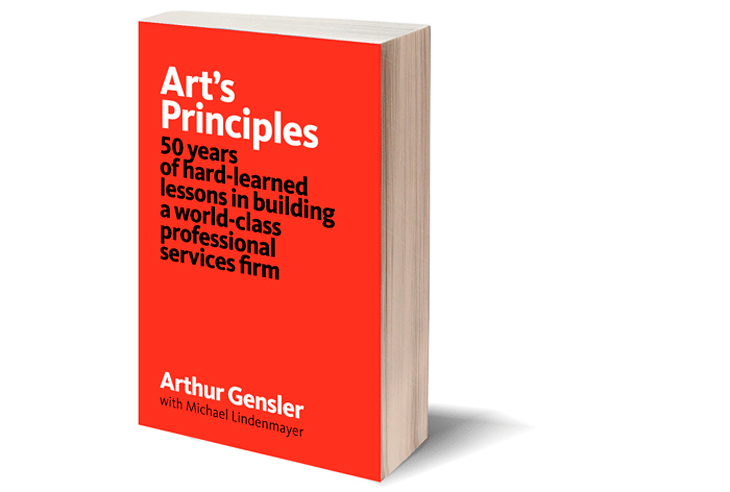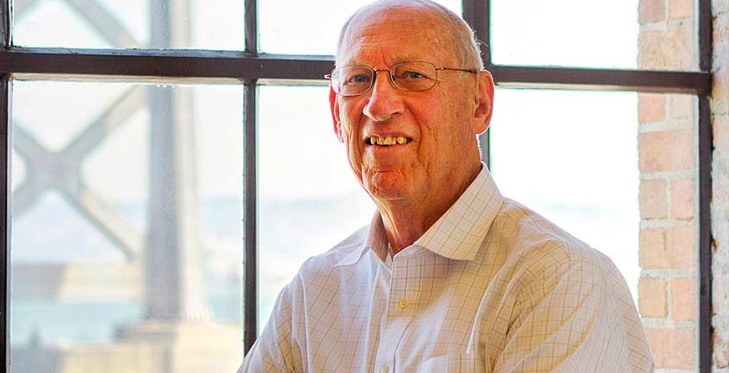The Cornell University College of Architecture, Art and Planning (AAP) recently celebrated the opening of its new Gensler-designed facilities in lower Manhattan, AAP NYC. To celebrate, the school invited Cornell alum Arthur Gensler, founder of Gensler, to speak to students, alumni, and friends of Cornell, and offer insights from his newly-released book, "Art’s Principles."
Gensler Principal Maddy Burke-Vigeland sat down with Art to talk about his experience as a student at Cornell, and explore its influence on his architectural career.
Burke-Vigeland: As a graduate of Cornell, we know you loved your experience in Ithaca. If you were a student today, would you opt for a semester in New York City?
Arthur Gensler: When I was a student, Cornell had neither a Rome Program nor a New York Program. I would have enjoyed experiencing them, but of course, I would have made sure that I would still be on campus during the full soccer season so I could be on the team!
Ithaca is a great college town, but exposure to cities is especially important for architecture and planning students. New York City offers a very different environment from Ithaca. Walking in Manhattan, students see cranes, construction sites, and a completely different urban environment than Ithaca offers.
 www.artsprinciples.com Image © Gensler
www.artsprinciples.com Image © Gensler
And the students also have the benefit of an exceptional program director, Bob Balder. Thanks to his background working for the New York City Planning Department, he knows every street, every tunnel of the city. He’s a great mentor to the students, who helps guide their experience. It’s a great opportunity for Cornell students.
Fifty percent of what students learn in college comes from the experience of being around other people, and doing things with them. It’s education that happens outside of the classroom. I think it’s important to get these experiences, including the experience of living in the city.
Burke-Vigeland: Art, you’ve brought some of your global perspective to the table for AAP initiatives, can you talk about some of these ideas?
Gensler: Cornell has always been influenced by the international design community. After I graduated, the school became strongly focused on the design philosophy of Le Corbusier. I have encouraged them to take a broad look at the US and international design community and also to focus on U.S. firms in their approach to the professional practice of architecture through the Gensler Visiting Critic Chair. That’s directly related to my personal experience.
When I was at Cornell, the AAP had a visiting critics program. The college invited practicing architects to come to Ithaca and spend three weeks a year with students, and there were quite a few different people who participated. They would come to Ithaca and live in a little house in the college town. Henry Hill was a critic who came and worked with my class, and he really encouraged students to spend time hanging out with him at the house. We would stay up until midnight talking about architecture.
It was Henry who initially encouraged me to come out to California; he told me I’d love it here. When I graduated, I spent six months in the ROTC, and then I took a military flight out to California. Henry was a wonderful mentor to me. He couldn’t hire me, but he helped me make connections, and launch my career. I’ll never forget his influence. I’m forever grateful to him.
Some years ago, when Cornell ended the visiting critics program, I knew that I had to endow a chair. We need practicing architects to talk to students about what it’s really like to practice architecture, and that’s why the program is so personally important to me.
Burke-Vigeland: You are about to launch your first book. Is this a text we might find in the AAP library? Is there a message in there for students?
Gensler: The book I have written, "Art’s Principles," is oriented toward those leading and running a professional practice. I hope it finds a home in the Cornell library.
When I started Gensler, there was a day when I woke up and realized that although I had 22 people working for me, I didn’t know what I was doing when it came to managing the business. So I went to business school at night. I ended up hiring the professor of my class, who would come into the office every Thursday night and worked with about 10 of us, including Tony Harbour and Charlie Kridler. He would give us assignments, including making budgets and making proposals. Then: he graded us.
One reason Gensler has been so successful is that we run our firm like a business. What I mean by this is that we continually reinvest in our business, we offer competitive wages, reinvest in people, offer profit sharing—we incorporated all kinds of things that architects never thought about. I did this because I wanted to hire people and ask them to stay forever, not work on a project-to-project basis.
Architecture is an art form, but it is also a business. Designers need to be trained to solve their clients’ problems through design while leading their own firms—large or small—to become sustainable practices. Hopefully my book will be incorporated into Professional Practice courses at Cornell, and also be incorporated into Continuing Education Units (CEU’s) for practicing professionals.
About the Author: Maddy Burke-Vigeland is an Architect and Principal who leads Gensler’s global network of Community Sector practice areas, which include our Education & Culture, Health & Wellness, Aviation & Transportation, Planning & Urban Design and Mission Critical Facilities practices. Contact her at maddy_burke@gensler.com.
More from Author
Gensler | Oct 21, 2024
3 surprises impacting the return to the office
This blog series exploring Gensler's Workplace Survey shows the top three surprises uncovered in the return to the office.
Gensler | Jun 26, 2024
5 ways ESG can influence design and create opportunities
Gensler sustainability leaders Stacey Olson, Anthony Brower, and Audrey Handelman share five ways they're rethinking designing for ESG, using a science-based approach that can impact the ESG value chain.
Gensler | May 20, 2024
10 spaces that are no longer optional to create a great workplace
Amenities are no longer optional. The new role of the office is not only a place to get work done, but to provide a mix of work experiences for employees.
Gensler | Apr 15, 2024
3 ways the most innovative companies work differently
Gensler’s pre-pandemic workplace research reinforced that great workplace design drives creativity and innovation. Using six performance indicators, we're able to view workers’ perceptions of the quality of innovation, creativity, and leadership in an employee’s organization.
Gensler | Mar 13, 2024
Trends to watch shaping the future of ESG
Gensler’s Climate Action & Sustainability Services Leaders Anthony Brower, Juliette Morgan, and Kirsten Ritchie discuss trends shaping the future of environmental, social, and governance (ESG).
Gensler | Feb 15, 2024
5 things developers should know about mass timber
Gensler's Erik Barth, architect and regional design resilience leader, shares considerations for developers when looking at mass timber solutions.
Gensler | Jan 15, 2024
How to keep airports functional during construction
Gensler's aviation experts share new ideas about how to make the airport construction process better moving forward.
Gensler | Dec 18, 2023
The impacts of affordability, remote work, and personal safety on urban life
Data from Gensler's City Pulse Survey shows that although people are satisfied with their city's experience, it may not be enough.
Gensler | Nov 16, 2023
How inclusive design supports resilience and climate preparedness
Gail Napell, AIA, LEED AP BD+C, shares five tips and examples of inclusive design across a variety of building sectors.
Gensler | Oct 16, 2023
The impact of office-to-residential conversion on downtown areas
Gensler's Duanne Render looks at the incentives that could bring more office-to-residential conversions to life.
















